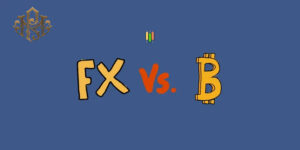
Close



In this comprehensive analysis, we examine the difference between the forex market and Bitcoin, and examine their structure, dynamics, volatility, regulation, and underlying assets. In the ever-evolving landscape of financial markets, two prominent players have emerged: the forex market and the bitcoin market. Both markets provide opportunities for traders and investors to profit from fluctuations in value, but they operate on distinct principles. They work and have unique features.
Forex market: With an average daily trading volume of more than 6 trillion dollars, it is the largest and most liquid financial market in the world. It operates 24 hours a day, five days a week, across major financial centers around the world. The market exchanges fiat currencies such as the US Dollar (USD), Euro (EUR), Japanese Yen (JPY) and British Pound (GBP) through a network of banks, financial institutions, companies, governments and individual traders of currency pairs. In the forex market, prices are determined by supply and demand dynamics influenced by economic indicators, central bank policies, geopolitical events and market sentiment.
Bitcoin Market: Part of the broader digital currency ecosystem, it operates on a decentralized network with blockchain technology. Bitcoin, the pioneering digital currency created in 2009 by an anonymous entity named Satoshi Nakamoto, introduced the revolutionary concept of digital money. Unlike the Forex market, which revolves around fiat currencies, the Bitcoin market is focused on a single digital asset, Bitcoin.
Trading takes place 24/7 on various cryptocurrency exchanges globally, allowing users to buy, sell, and trade Bitcoin for fiat or other cryptocurrencies. The market’s decentralized nature, internal scarcity (limited supply of 21 million coins), and cryptographic security contribute to its unique structure and functionality.

Forex Market: Known for its liquidity and relatively stable price changes compared to other financial markets. Major currency pairs typically exhibit moderate volatility, with price fluctuations influenced by economic data releases, interest rate decisions, geopolitical developments, and macroeconomic trends. While occasional spikes in volatility may occur during major events such as central bank announcements or geopolitical crises, the forex market generally maintains a semblance of stability, offering traders looking for consistent returns and Risk management attracts.
Bitcoin Market: In contrast, the Bitcoin market is known for its extreme volatility and rapid price swings. The price of Bitcoin can fluctuate by several percent within minutes or hours, creating opportunities for significant profit or loss. Factors that contribute to Bitcoin volatility include speculative trading activities, market sentiment, regulatory announcements, technological developments, security breaches, and macroeconomic factors. While volatility is inherent in emerging asset classes such as cryptocurrencies, it poses challenges for risk management and requires traders to adopt robust strategies to effectively navigate price volatility.

The forex market is comprehensively regulated in most jurisdictions, with regulatory oversight aimed at maintaining market integrity, transparency and investor protection. Regulatory bodies such as the Commodity Futures Trading Commission (CFTC) in the United States, the Financial Conduct Authority (FCA) in the United Kingdom, and the European Securities and Markets Authority (ESMA) enforce regulations related to forex trading, brokerage, and financial activities. Institutional regulatory frameworks cover areas such as licensing, capital requirements, risk management, segregation of client funds, and anti-money laundering (AML) compliance.
Bitcoin Market: Regulation of the Bitcoin market and the broader cryptocurrency industry varies significantly across jurisdictions, ranging from active regulatory frameworks to outright bans or restrictions. While some countries have embraced cryptocurrencies and enacted laws to regulate exchanges, custodians and service providers, others have taken a cautious approach due to concerns about consumer protection, financial stability and illegal activities. have adopted or imposed strict regulations.
Regulatory challenges, jurisdictional disputes, and evolving compliance requirements create complexities for Bitcoin market participants, leading to regulatory arbitrage and uncertainty.
Forex market: Currencies traded in the forex market represent fiat money issued by governments, and the central banks of these currencies derive their value from economic fundamentals, monetary policies, interest rates, inflation, trade balance and geopolitical stability. . Major currency pairs, including EUR/USD, USD/JPY, and GBP/USD dominate forex trading volume, with traders speculating on exchange rate volatility based on fundamental and technical analysis.
Bitcoin Market: The main asset in the digital currency market, it acts as a decentralized digital currency outside the control of central authorities. Its value is determined by market supply and demand dynamics, network adoption, technological developments and investor sentiment. Bitcoin’s rarity, fixed supply, fungibility, divisibility, and resistance to censorship distinguish it from traditional fiat currencies. In addition to Bitcoin, the cryptocurrency market includes thousands of alternative coins (altcoins) with diverse uses, technological features, and value propositions.
While both the forex and bitcoin markets provide opportunities for traders and investors to capitalize on price movements, they differ significantly in terms of structure, volatility, regulation, and underlying assets. Characterized by its size, liquidity, stability and regulatory oversight, the forex market remains a cornerstone of global finance and facilitates international trade and investment.
On the other hand, the Bitcoin market, driven by innovation, decentralization and speculation, represents a paradigm shift in monetary systems that challenges conventional concepts of currency and finance. Understanding the fundamental differences between these markets is essential for traders and investors to effectively navigate the complexities of the financial landscape and capitalize on opportunities while managing risks.